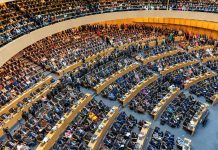Africa-Press – Mauritius. After publishing ‘Democracy in Africa’ back in 2015, I spent the next few years answering all kinds of questions about the prospects for democratic consolidation on the continent.
Was the biggest challenge ethnicity? Was it infrastructure? Was it the colonial legacy? Does foreign aid do more good than bad? One question in particular stuck in my mind because it came up fairly regularly and I was never quite sure how to answer it: does size matter?
The idea that it is easier to foster democracy in smaller countries makes intuitive sense. Of course it must be easier to manage a smaller country in the same way that it is less demanding to run a smaller business: Wouldn’t there be fewer ethnic tensions and conflicts? And wouldn’t it be a boon for delivering public services to the population?
For democracy then, just as in other areas of life, it is not just size that matters, but what you do with it. My new article – written with some brilliant co-authors who have been doing great research on these issues for a long time – reveals that this is only part of the story.
Size is important, but so is socio-economic context and political leadership. Many of Africa’s smaller countries are not simply less authoritarian because of their size, but also because they evolved into more cohesive societies that made it easier to avoid conflict.
This didn’t naturally happen simply because these countries were less populous, but because leaders made it a priority and – especially in the case of the continent’s small islands – because the evolution of more integrated societies reduced the potential for ethnic and other divisions to generate political instability.
For democracy then, just as in other areas of life, it is not just size that matters, but what you do with it. Why small can be beautiful At first glance, African states’ experience since the reintroduction of multiparty politics in the early 1990s suggests that small is beautiful.
The vast majority of the countries usually classified as “full democracies” are either physically small, such as Ghana, or have small populations, such as Botswana and Namibia, which have less than three million inhabitants.
Similarly, Benin and Senegal, two of the countries known for having fairly open and competitive political systems on the continent – at least until recently – have populations of just 12 million and 17 million, respectively.
The democratic fate of Africa’s larger states also suggests that size is important. Of the ten most populous countries, only one – South Africa – is a democracy.
Many of the others – the Democratic of Congo (DRC), Kenya, Ethiopia, Nigeria, Sudan – have experienced considerable conflict and long periods of authoritarianism.
There are a number of reasons that size might matter, such as the greater feasibility of maintaining law and order in smaller territories, but perhaps the most interesting and overlooked factor is the way size shapes the relationships between political leaders and their populations.
As we explain in the article, when populations are really small – as with countries like Cabo Verde, São Tomé and Príncipe and Seychelles, which have a population under 600,000 – a particularly intimate form of politics can emerge in which there is less distance between citizens and leaders.
It is telling, for example, that the acronym for São Tomé, STP, is often jokingly interpreted as ‘somos todos primos’ (we are all cousins). The direct relationship citizens and senior politicians – which in larger countries would be mediated by multiple tiers of brokers – means that “clients” have more information and power vis-à-vis their “patrons” than is often the case.
While this can foster a form of extremely informal and corrupt political ties, it also places greater constraints on political leaders, reducing the prospects for authoritarian abuse.
The limits of size When we look a bit closer, however, the relationship between size and democracy turns out to be considerably less straightforward than it initially appears.
While less populous countries are on average more democratic than larger ones, some of Africa’s smallest countries are highly authoritarian, including Djibouti, Equatorial Guinea, eSwatini, and Gabon.
There are also plenty of smaller countries with histories of conflict and instability. Prolonged episodes of ethnic violence in countries such as Burundi and Rwanda puts to bed any idea that smaller states are inherently easy to manage, or necessarily generate more cohesive societies.
Neither has being small served to insulate countries from the authoritarian winds that have blown across the continent in recent years. The last decade has seen growing concern about democratic backsliding number of smaller countries that had previously been described as “leading democratic lights”, including Benin, Mauritius and Senegal.
Islands of democracy? Our article draws out new lessons about when and how size matters by looking at the experience of Africa’s small island states – Cabo Verde, Comoros, Mauritius, São Tomé and Príncipe and Seychelles.
Although there is considerable variation between these countries, with Comoros having experienced greater instability and more authoritarianism, this group of countries is significant more democratic on average than those on the mainland.
According to the well-known index produced by Freedom House, while only 14% of mainland countries are “free”, this figure rises to 60% when we look at small island states.
We argue that size is an important part of the story for these countries, but so is their island status, and the distinctive way that their societies evolved.
On the one hand, a large proportion of the population of these islands arrived relatively recently from other parts of the world, so that it was clear they were not “sons of the soil”.
On the other hand, a process of creolisation – the blending of different cultural heritages and ethnic groups – led to the ‘development of a new common culture and collective identity’ in countries such as Cabo Verde and São Tomé.
Taken together, these processes constrained the emergence of the damaging ‘politics of belonging’ that has created so many challenges for democratic consolidation in parts of mainland Africa.
A similar process occurred in some mainland states, but only where post-colonial leaders implemented sustained nation-building campaigns. Being islands also helped in other ways. Limited global power has fostered a stronger sense of a shared identity.
At the same time, their offshore location means that these states have not been as negatively impacted by the spill over of civil war or political upheaval in neighbouring countries, which have at times impeded state building on the mainland.
This doesn’t mean that being an island is a panacea, or that it trumps size. As demonstrated by the chequered authoritarian history of coup-prone Madagascar – the fourth largest island in the world – offshore states with large populations may face just as many democratic challenges as countries on the mainland.
In other words, on their own neither size nor “insularity” can explain the patterns we see in democracy in sub-Saharan Africa: it is the interaction between the two that reduces the risk of authoritarian rule.
Which way forward? These findings are important for anyone interested in the study of democracy in Africa, but hardly provide a useful road map for pro-democracy policymakers.
Islands with cohesive societies cannot be created to reduce the prospects of authoritarianism, especially as the historical conditions that gave rise to this situation involved exploitative colonial rule.
There are some important lessons here for contemporary debates about the value of decentralization, and whether allowing disgruntled regions such as Casamance (Senegal), Biafra (Nigeria) and Somaliland (Somalia) to break away and form new states would boost development and democracy, however.
Leaving aside the question of whether smaller countries would be economically sustainable, secession is only likely to result in more successful states if political elites are committed to fostering more cohesive societies, integrating newly created minorities and majorities into a coherent nation. It is only when more intimate politics goes hand-in-hand with progressive leadership that small is truly beautiful.
For More News And Analysis About Mauritius Follow Africa-Press







